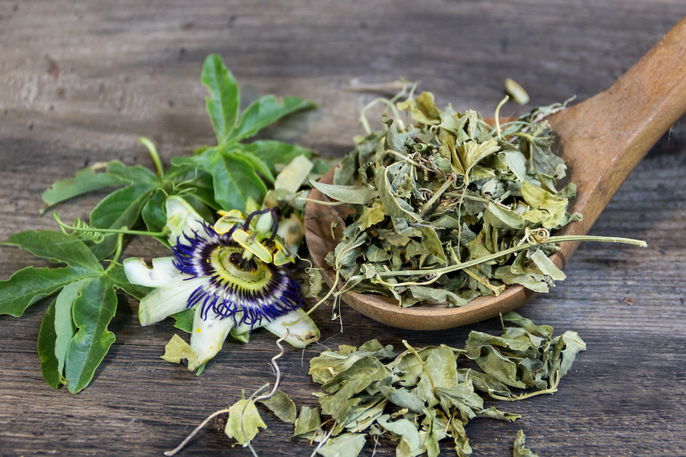Passionflower is a medicinal plant with calming properties that act on the central nervous system. It is commonly used to relieve stress and anxiety and to treat insomnia.
Passionflower also contains flavonoids, anthocyanins, alkaloids, and amino acids that are useful in the treatment of menopause, hypertension, and attention deficit disorder (ADD). It should only be consumed as directed by a doctor or other licensed healthcare provider.
Passionflower is the flower of the passion fruit plant. Its scientific name is Passiflora incarnata L. Passionflower can be found in health food stores, online, and in some pharmacies.

Health benefits
Passionflower can be used for:
1. Combating stress and anxiety
Passionflower contains flavonoids, such as chrysin, that interfere with the function of gamma-Aminobutyric acid (GABA). GABA is an inhibitory neurotransmitter in the central nervous system that helps regulate sleep cycles, improve mood, and decrease anxiety and stress.
Also recommended: 10 Natural Remedies for Anxiety (& How to Prepare) tuasaude.com/en/natural-remedies-for-anxiety2. Lowering blood pressure
Some studies suggest that passionflower helps lower blood pressure and heart rate. Passionflower is a cardiotonic agent and vasodilator that possesses antihypertensive and muscle relaxing properties. It may be indicated as a complementary therapy in the treatment of high blood pressure and heart disease.
3. Regulating cardiac rhythms
The flavonoids and alkaloids found in passionflower have a calming effect that helps to regulate cardiac rhythm. This is mostly beneficial to people presenting with tachycardia or palpitations triggered by anxiety.
4. Improving symptoms of menopause
The active ingredients in passionflower help alleviate symptoms associated with menopause, such as palpitations, insomnia, hot flashes, headache, and irritability.
Also recommended: 13 Natural Remedies for Menopause Symptoms tuasaude.com/en/natural-remedies-for-menopause5. Preventing seizures
Some of the flavonoids present in passionflower have anticonvulsive properties that act on the central nervous system to prevent seizures and decrease their duration and frequency. They may be useful in the treatment of absence seizures and epilepsy.
6. Decreasing the risk of cancer
Passionflower contains chrysin, a flavonoid with antioxidant and anti-inflammatory properties that may help protect against different types of cancer, including breast cancer, oropharyngeal cancer, lung cancer, colon cancer, prostate cancer, and leukemia. More studies are needed to confirm this benefit.
7. Alleviating digestive problems
Passionflower is traditionally used in the treatment of gastrointestinal illness due to its anti-inflammatory and antispasmodic properties. These help to improve intestinal function and reduce digestive spasms associated with gastritis and colitis.
In addition, passionflower possesses antibacterial properties that may work against Helicobacter pylori, a common cause of stomach ulcers.
Also recommended: How to Relieve Gastritis Pain Fast (with 10 Natural Remedies) tuasaude.com/en/home-remedies-for-gastritis8. Treating inflammatory disease
Passionflower has anti-inflammatory properties that help inhibit cytokines, enzymes, and histamines that cause inflammation in conditions like rheumatoid arthritis and psoriasis, for example. For this reason, passionflower may be indicated as a complementary therapy in the treatment of these diseases.
How to prepare
Passionflower can be consumed in a variety of forms, including:
1. Tea
Passionflower tea can be prepared by adding 2 Tbsp of passionflower to a cup of boiling water. Let it steep for 10 minutes, then strain and drink. For the treatment of insomnia, drink one cup right before bed. For stress and anxiety, drink 3 times per day.
2. Tincture
Passionflower tinctures can be found in pharmacies and health food stores and can be used in a concentration of 1:10. The recommended dose is 4 drops diluted in 1 cup of water, 1 to 3 times per day, as directed by your doctor or herbal medicine specialist.
Read how to make a tincture.
3. Pills
Passionflower pills may contain other medicinal plants, like valerian, and can be found in some health food stores. The recommended dose is 200 to 500 mg, 2 to 3 times a day, as directed by your doctor or herbal medicine specialist.
Side effects
The main side effect of passionflower is excessive sleepiness, therefore it is recommended to avoid driving and operating heavy machinery. Passionflower can also decrease reflexes and may lower your blood pressure. Make sure to check with your doctor or primary care provider before taking passionflower.
Nausea, vomiting, headache, and tachycardia may also occur, but are very rare.
Contraindications
Passionflower is contraindicated in people with an allergy to passionflower or any of its components. It should not be consumed with alcohol or other calming agents such as sedatives and antihistamines. In addition, passionflower should not be taken at the same time as aspirin, warfarin, heparin, antiplatelets, or nonsteroidal anti-inflammatories (NSAIDs) due to an increased risk for bleeding.
People who are pregnant or breastfeeding should not take passionflower. It should not be given to children under the age of 12.






























